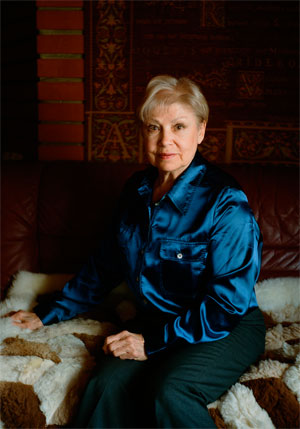Larisa Latynina, USSR
Simply sign up to the Life & Arts myFT Digest -- delivered directly to your inbox.
Rome, 1960
Gymnastics
The 1960 gymnastic events were held in the ancient ruins of the Terme di Caracalla, the baths of Imperial Rome. Larisa Latynina was impressed, but she had a record to defend and was not going to be thrown off balance by the dramatic setting. “It was all very interesting and unusual,” she says. “I don’t remember feeling afraid. Before going to bed I went through all my exercises in my head. I slept very well.”
Latynina had caused a sensation in 1956 when she won six medals with a grace that changed the face of gymnastics. In Rome, she collected a further six medals and the Soviet team scooped up all but one of the 16 awards for women’s gymnastics. By the close of the 1964 Tokyo Games, Latynina was the greatest Olympian of all time by medal count - 18 in total.
Now retired, Latynina lives with her husband in the countryside outside Moscow. Their house, guarded by two huge Caucasian mountain hounds, is filled with memorabilia of her gymnast days. Although she walks with a slight limp, she is still straight-backed and graceful and flushed with her own success. “No one has won more medals than me,” she says, flashing a triumphant smile. “Eighteen, and nine of them are gold.”
Latynina was born in 1934 in the Ukraine, then part of the Soviet Union. Her father abandoned the family, leaving her mother, a cleaner, to raise their only child. Like most Russians of her generation, Latynina’s early life was overshadowed by the second world war. To escape she dreamed of becoming a ballerina. Her mother took a second job stoking boilers to pay for dance classes. “Mother was very strict, very demanding. She was completely illiterate and determined that I would achieve something in life.” When the local ballet school closed, she switched to musical gymnastics.
Soviet sports trainers were under pressure to deliver results and would mercilessly drive athletes. There was no need to push Latynina. “I was so patriotic. If someone started to say bad things about my country I would always rush to defend it,” she says. After winning the national school gymnastics championship in 1951, she enrolled at a technology institute in Kiev, but soon dropped her studies to concentrate on sports. Alexander Mishakov, her new coach, recognised a winner. “Just do your best,” he would say. “If there’s someone better, we’ll come back and practise harder.” In 1958 she won a competition while four months pregnant, keeping her condition a secret from the team.

Fame sometimes brought unwelcome attention – she remembers with alarm the crowds tossing her in the air with jubilation when she returned from the Olympics. But there were benefits that ordinary Soviet citizens could not even dream of – a spacious flat, good food while training, and a glimpse of the outside world. Athletes received a miserly $2 to $3 a day on foreign tours and were kept under close watch by KGB minders. They spent all their free time bargain- hunting. “When we went home we were dressed like dolls. Everyone envied us. We were happy.”
After her career as a competitive gymnast ended, Latynina became the national team coach. Under her stewardship, Soviet gymnasts landed a total of 10 gold medals at the Olympics in Mexico City, Munich and Montreal. She resigned in 1976. In London, she will root for the Russian team and is ready, after more than 50 years, to surrender her crown as the greatest Olympian of all time. Michael Phelps, the US swimmer, is expected to win the three medals he needs to break her record. A photograph shows Phelps towering above her – he’s holding a souvenir Russian matroyshka doll. “He’ll beat me, I’m sure. But I’ll still hold the record as a woman,” she says. “And I have trained 10 Olympic medallists. Let Phelps remember that.”
……………………………………………………………..
Arie Gluck, Israel: http://on.ft.com/KoHXKH
Ben Ainslie, Great Britain: http://on.ft.com/KoHZT3
Billy Mills, USA: http://on.ft.com/KoI3SP
Carla Marangoni, Italy: http://on.ft.com/KoI8Wn
Derek Redmond, Great Britain: http://on.ft.com/MRP7wg
Ellie Simmonds, Great Britain: http://on.ft.com/MRQICi
Gezahegne Abera, Ethiopia: http://on.ft.com/MRQGKJ
Ingeborg Sjöqvist, Sweden: http://on.ft.com/KoJ4tS
John Carlos, USA: http://on.ft.com/KoJ3pU
Kenneth Matthews, Great Britain: http://on.ft.com/KoJ0un
Kip Keino, Kenya: http://on.ft.com/KoIYT2
Lawrence Lemieux, Canada: http://on.ft.com/KoIRqG
Margaret Maughan, Great Britain: http://on.ft.com/MRQg7c
Mark Spitz, USA: http://on.ft.com/KoIOuW
Michael Johnson, USA: http://on.ft.com/MRQ9sc
Muriel Pletts, Great Britain: http://on.ft.com/MRQ7Ay
Nadia Comaneci, Romania: http://on.ft.com/MRPYxh
Nawal el-Moutawakel, Morocco: http://on.ft.com/MRPRS4
Odlanier Solís, Cuba: http://on.ft.com/KoIBIj
Olga Fikotová, Czechoslovakia: http://on.ft.com/KoIrRg
Sándor Tarics, Hungary: http://on.ft.com/MRPvuY
Sarah English/Anthea Stewart, Patricia Davies, Zimbabwe: http://on.ft.com/KoIigC
Comments